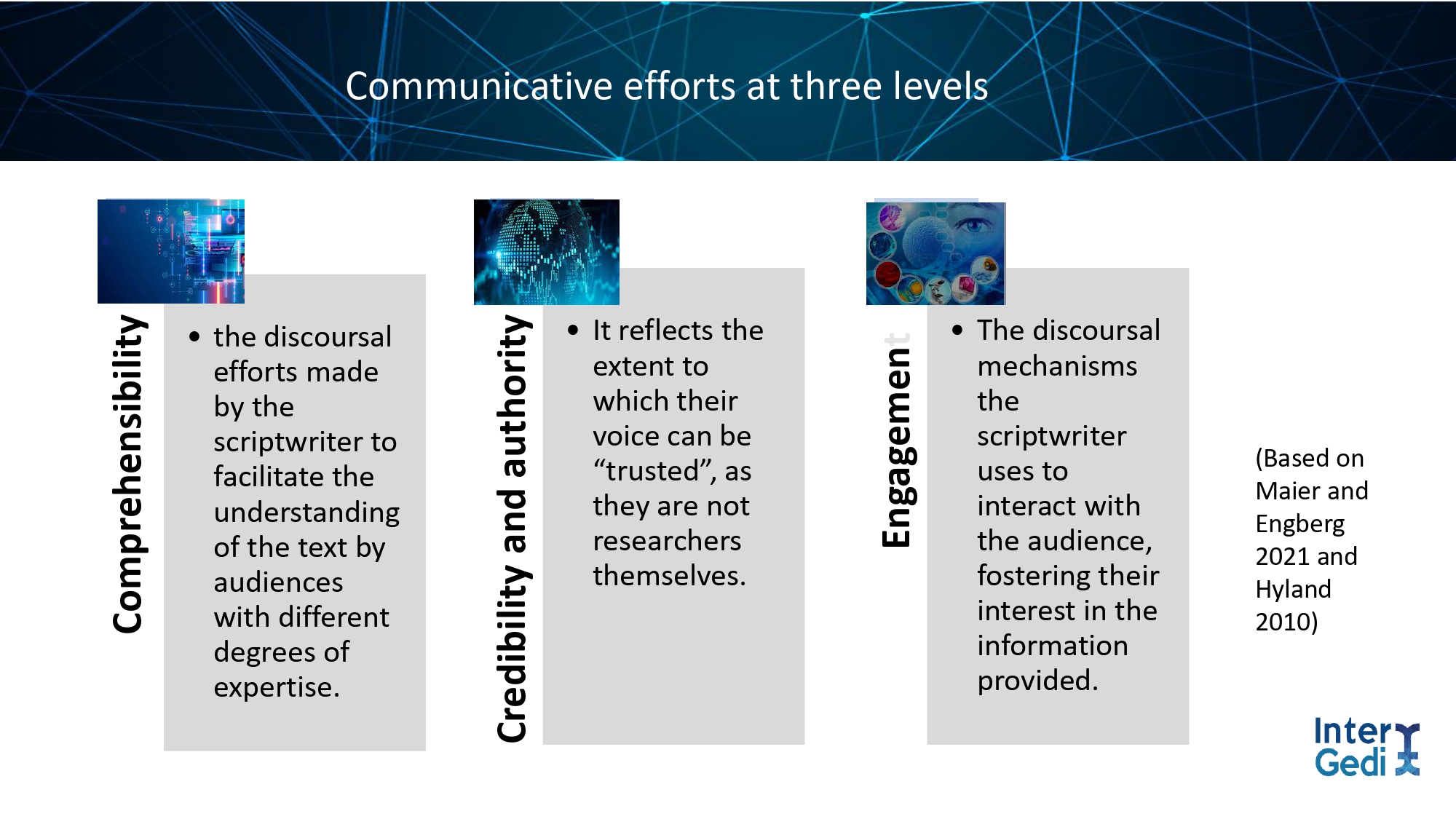AESLA 2023: Rosa Lorés explores communicative efforts in the digital dissemination of science

Dr. Rosa Lorés presented her paper “Bridging knowledge asymmetries: Communicative efforts in the digital dissemination of science” at the 40th AESLA (Asociación Española de Lingüística Aplicada) conference, hosted by the University of Extremadura on April 26th to 28th. In her presentation, she focused on the communicative efforts found in research digests at three dimensions (comprehensibility of the text, the credibility and authority of the writer-mediator’s voice and engagement). Lorés argued that, within such efforts, there stand out the reliance on diverse discursive features in each dimension, as well as their combination with visual and platform-specific affordances (namely images and hyperlinks). All these constitute the essence of the recontextualization processes found in this type of digital text.
The full abstract of Rosa Lorés’ talk can be consulted as follows:
Bridging knowledge asymmetries: Communicative efforts in the digital dissemination of science
The increasing demands for an accessible science to the general public are currently answered by scientists, institutions, and organizations who see them as an opportunity to comply with their compromise with citizenship. However, to make science ‘popular’ does not merely mean reporting scientific facts to a less specialist audience. The existent ‘knowledge asymmetries’ in science communication (Ditlevsen and Kastberg, 2011; Gotti, 2014; Bondi et al., 2015; Engberg, 2016) generate ‘communicative efforts’ (Maier and Engberg, 2021: 187) to bridge such asymmetries so that expert knowledge is recontextualized.
To explore these ‘communicative efforts’ I here focus on the research digests written by science journalists and published by institutions and professional organizations on their official websites, which aim at disseminating research findings in their discipline. Building on Maier and Engberg’s (2021) notion of ‘communicative efforts’ and Hyland’s (2010) concept of ‘proximity’, I propose to explore three dimensions to identify processes of recontextualization through the discoursal features used in research digests. These dimensions are i) comprehensibility of text, ii) credibility and authority of the scriptwriter’s voice, and iii) engagement with the audience. For such purposes, a corpus of 20 online research digests drawn from the British Psychological Society website (https://www.bps.org.uk/) has been explored using NVivoPro for qualitative and quantitative analysis. Several discoursal features have been identified as resources used by science journalists to weave a voice that manages to engage a diversified audience while keeping the expert scientist’s authoritative stance. These discoursal features are code glosses (comprehensibility), evidentials and references to the researchers’ persona (credibility and authority), and engagement markers (inclusive we, reader pronouns, questions, and directives to engage with the audience). Moreover, the combination of discoursal features with visual resources (i.e. pictures) and digital affordances (i.e. hyperlinks) is found to be a significant ‘communicative effort’ to bridge knowledge asymmetries.
Keywords: research digests, recontextualization, comprehensibility, credibility, engagement
References
Bondi, Marina, Silvia Cacchiani & Davide Mazzi. 2015. Discourse in and thorough the media: Recontextualizing and reconceptualizing expert discourse. Newcastle upon Tyne, UK: Cambridge Scholars Publishing.
Ditlevsen, Marianne Grove & Peter Kastberg. 2011. Editor’s Preface in Knowledge Asymmetries. Special Issue. Fachsprache. International Journal of Specialized Communication Vol. XXXIX (3-4). 136-137.
Engberg, Jan. 2016. Conceptualizing corporate criminal liability: legal linguistics and the combination of descriptive lenses. In Tessuto, Gerome, Vijay K. Bhatia, Giuliana Garzone, Rita Salvi & Christopher Williams (Eds.). Constructing Legal Discourses and Social Practices: Issues and Perspectives (pp. 28- 56). Newcastle upon Tyne: Cambridge Scholars Publishing.
Gotti, Maurizio. 2014. Reformulation and recontextualization in popularization discourse. Ibérica 27 (27). 15- 34.
Hyland, Ken. 2010. Constructing proximity: Relating to readers in popular and professional science. Journal of English for Academic Purposes 9. 116–127. https://doi.org/10.1016/j.jeap.2010.02.003
Maier, Carmen Daniela & Jan Engberg. 2021. Harvard Business Review’s reframing of digital communication: From professional expertise to practical guidance. Journal of Pragmatics 176. 186-197. https://doi.org/10.1016/j.pragma.2021.02.005
